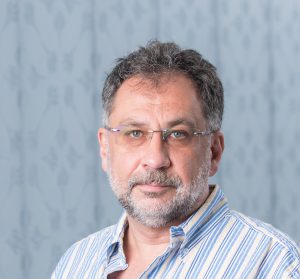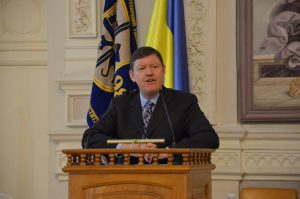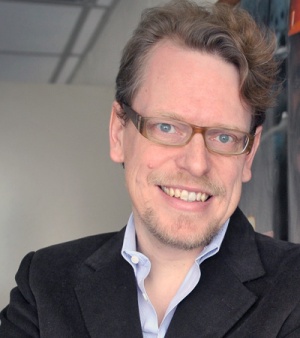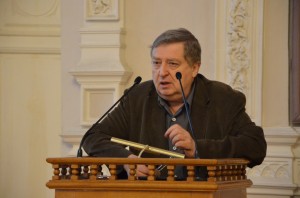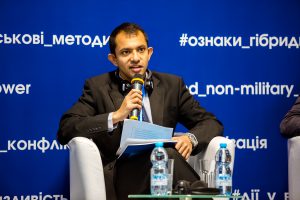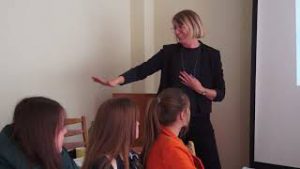Georgi Derluguian
In August 1990, he was invited to work at the Fernan Brodel Center for the Study of Economics, Historical Systems, and Civilizations at The State University of New York at Binghamton. In 1995 he defended his dissertation in sociology (Ph.D.) on “Variants of separatism during the collapse of the USSR: Why Tatarstan is not Chechnya, and Adjara is not Abkhazia.”
He worked at the Universities of Michigan and Cornell; from 1997 to 2011 he taught historical sociology and international affairs at Northwestern University, Chicago. In 2011 he moved to a new branch of New York University in the Emirate of Abu Dhabi.
He has been a visiting professor at Yokohama University, Japan; Bordeaux, France; European University of St. Petersburg, Russia; Tbilisi State University, Georgia.
Laureate of the scholarship for the Andrew Carnegie Fellows Program (USA, 1999), awards of the American Sociological Association for the best monograph of the year in the categories of political sociology (2006) and political economy of the world system (2007), as well as the Norbert Elias Essay Prize (Netherlands, 2008) and numerous research awards and grants.
Author of the fundamental monograph “Bourdieu’s Secret Admirer in the Caucasus: A World-System Biography.” In 2013, together with I. Wallerstein, M. Mann and C. Calhoun, he published a discussion book “Does Capitalism Have a Future?”. Georgy Derlugyan’s works have been translated into 19 languages, including Japanese, Chinese, Korean, French, German, Spanish, Turkish, Arabic, Farsi, Armenian, Georgian and Ukrainian.
He gave the following lectures at the Igor Sikorsky KPI:
June 3, 2015 “Taming of the Leaders” (as part of the International conference KPI “Social and political configurations of the Modern: political power in Ukraine and the world.”
June 5, 2015 “On the accelerated modernization of states in the modern world system: who and how succeeded and why others failed?”
October 4, 2014 “The extinction of the ideology of the twentieth century and the evolutionary prospects of equality in human communities.”
Selected publications:
Books:
- Wallerstein, Immanuel; Derluguian, Georgi; Calhoun Craig; Collins, Randall; Mann, Michal (2013). Does Capitalism Have a Future?. Oxford University Press. ISBN 978-0-19-933085-0.
- Derluguian, Georgi (2005). Bourdieu’s Secret Admirer in the Caucasus: A World-System Biography. Chicago: University of Chicago Press. ISBN 0-226-14283-3.
- Derluguian, Georgi; Greer, Scott L. (2000). Questioning Geopolitics: Political Projects in a Changing World-System. Westport, Conn.: Greenwood Press. ISBN 0-275-96656-9.
Articles
- Derluguian G.M. The Process and the Prospects of Soviet Collapse: Bankruptcy, Segmentation, Involution // Questioning Geopolitics: Political Projects in a Changing World-System / Ed. by G.M.Derluguian, S.L.Greer. – Westpoint; L.: Greenwood Press, 2000. – Р. 203–226.
- Derluguian G. Recasting Russia // New Left Review. – 2001. – № 12. – P. 5–31.
- Derluguian G. The Capitalist World-System and Socialism // Encyclopedia of Nationalism. – San Diego: Academic Press, 2001. – P. 55–80.
- Derluguian G. Under Fond Western Eyes // New Left Review. – 2003. – № 24. – Р. 136–144.
- Derluguian G.M., Goldfrank W.L. Introduction: Repetition, Variation, and Transmutation as Scenarios for the Twenty-first Century // Questioning Geopolitics: Political Projects in a Changing world System / Ed. by G.M.Derluguian, S.L.Greer. – Westpoint; L.: Greenwood Press, 2000. – P. 1–1
Thesis at the conference in KPI:
Georgi Derluguian, Timothy Earle, Will Reno Taming the chief // Social and political configurations of Modern: political power in Ukraine and the world: materials of the IV International. scientific-practical conf., Kyiv, June 3-4, 2015 / compilers: G. Derlugyan, A.A. Melnychenko, P.V. Kutuev, Migalush A.O. – K .: Talcom, 2015. – P.23-24.
Chris Weston – Doctor of Economics, President of Weston Consulting (Warsaw, Poland).
Lectures for the Igor Sikorsky KPI community:
November 29, 2016 “Unsplendid isolation: the political and economic consequences of the Brexit referendum”.
May 18, 2017 “The Korean Island: North and South Korea between Geopolitics and Geoeconomics”
May 18, 2017 “Trump’s Watergate and Impeachment ?: Examining the Nikson episode. A case study in historical political sociology ”
November 24, 2017 “North Korea: Interpretation of Behavior”
November 24, 2017 “Brexit and its consequences”
Field of research: international economics.
Academic career: In 2015, he received a Doctor of Philosophy (PhD) degree from the Warsaw School of Economics.
Scientific works:
- Chris Weston. The National State, Modernization and Globalizations: The Case of South Korea in the 1960s to 1980s // Bulletin of NTUU “KPI”. Politology. Sociology. Law: a collection of scientific papers. – 2014. – № 1 (21). – P. 48-60.
- Chris Weston. Transition from the Shah to Shiite Theocracy, and the Rise of the Pasdaran as a political, military and economic institution // Bulletin of the Taras Shevchenko National University of Kyiv: Sociology. – – 1 (5). – P. 20-24.
- The Korean Island: North and South Korea between Geopolitics and Geoeconomics // Capitalism, Populism and Modernism: VIII International Scientific and Practical Conference on Sociology (Odessa, May 18-19, 2017) / Compilers: A.A. Melnychenko, P.V. Kutuev, O.O. Onufrienko. – Odessa: Helvetica Publishing House Printing House, 2017. – P. 28-29.
- Chris Weston. Political Economy of a Post Communist Mafia State: Hungary as a Case Study // Historical Sociology of Civilizations: Modernism between Democracy and Inequality: Proceedings of the VI International Scientific Practice. conf. (Kyiv, May 30-31, 2016) / Compilers:A.A. Melnychenko, P.V. Kutuev. – K .: Polytechnic, 2016. – P.20-21.
- Chris Weston. The Post Communist Mafia State // Historical Sociology of Civilizations: Modernism Between Democracy and Inequality: Proceedings of the VI International Scientific Practice. conf. (Kyiv, May 30-31, 2016) / Compilers: A.A. Melnychenko. – K .: Polytechnic, 2016. – P. 21-23.
- Chris Weston. Unsplendid isolation: the political and economic consequences of the Brexit Referendum // State and global social changes: 25 years of Ukrainian independence: Materials of the VII international scientific-practical. conf. (Kyiv, November 29-30, 2016) / Compilers: A.A. Melnychenko, P.V. Kutuev – Kyiv; Odessa: Ice Print Printing House, 2016. – P. 22-23.
- Chris Weston. Europe in the Shadow of Violence: Islamic State analyzed in the Northern Conceptual Framework // State and global social changes: historical sociology of domination and resistance in the modern era: Materials of international scientific practice. conf. (Kyiv, November 26-27, 2015) / Compilers A.A. Melnychenko, P.V. Kutuev, A.O. Migalush. – K .: Talcom, 2015. – P.31-32.
- Chris Weston. “Bob’s Your Uncle” and the Continuing Prevalence of Dynastic Politics in the Modern Era // Social and Political Configurations of Modernism: Political Power in Ukraine and the World: Proceedings of the IV International. scientific-practical conf., Kyiv, June 3-4, 2015 / compilers: G. Derluguian, A.A. Melnychenko, P.V. Kutuev, A.O. Migalush. – K .: Talcom, 2015. – P.295-296.
- Chris Weston. Ukraine after the 2014 war: periphery or semi periphery? // Great wars, great transformations: historical sociology of the 20th century, 1914-2014: Materials of international scientific practice. conf. (Kyiv, November 27-28, 2014) / Compilers: A.A. Melnychenko, P.V. Kutuev, A.O. Migalush. – K .: Polytechnic, 2014. – P. 28-29.
Chris Weston. The national state, modernization and globalization: the case of South Korea // Variations of Modern and modernization: Ukrainian society in the context of global processes: Materials between. born scientific-practical conference. (Kyiv, November 28-29, 2013) / Compiler: P.V. Kutuev. – K .: “Talcom”, 2013. – P. 36-37.Кріс Вестон (Chris Weston)
Lucan Way is a professor of political science at the University of Toronto.
Lectures for the Igor Sikorsky KPI community:
May 29, 2015 “Revolutionary Origins and the Durability of Soviet Totalitarianism”.
Research field: democratic transformations and evolution of authoritarian regimes in the countries of the former Soviet Union, in particular in the interregional perspective, democratization, authoritarianism, post-communist policy.
Academic Career: Lucan Ahmad Wei holds a Ph.D. from the University of California, Berkeley and is a professor of political science at the University of Toronto. He received scholarships from Harvard University (Harvard Academy and the Davis Center for the Development of Russian and Eurasian Studies) and the University of Notre Dame (Kellogg Fellowship).
He is the co-director of the Program for the Study of Ukraine named after Peter Jacyk and is co-chair of the editorial board of the magazine “Democracy”.
Winner of the Best Political Paper Award from the American Political Science Association’s Comparative Democratization Section, 2006.
Scientific works:
- Way L. Review of Patronal Politics: Eurasian Regime Dynamics in Comparative Perspective. By Hale Henry E.. New York, NY: Cambridge University Press, 2014. 558p.// Perspectives on Politics. – 2017. –15(2). –Р. 580-582
- Mickey R., Levitsky S., Way L. Is America Still Safe for Democracy? Why the United States Is in Danger of Backsliding// Foreign affairs. – may-jun 2017. – P. 20-29
- Way L. Response to Henry E. Hale review of Pluralism by Default: Weak Autocrats and the Rise of Competitive Politics// Perspectives on Politics. – 2017. – 15 (2). – Р. 579-580
- Fish M.S., Samarin M., Way L. Russia and the CIS in 2016: Pursuing Great Power Status// Asian Survey. – 2017. – 57 (1). – Р. 93-102
- Johns Hopkins, Lucan Way. Pluralism by Default: Weak Autocrats and the Rise of Competitive Politics. –
- Levitsky S., Way L. The myth of democratic recession// Journal of Democracy. – 26 (1). – – Р. 45-58
- Way L. Civil society and democratization// Journal of Democracy. – – 25 (3). – Р. 35-43
- Levitsky Steven, Lucan Way. Competitive Authoritarianism: Hybrid Regimes after the Cold War// New York: Cambridge University Press. – – Р. 520
- Levitsky Steven, Lucan Way. The Myth of the Democratic Recession // Journal of Democracy – 2015. – 26. – Р.45-58
- Levitsky Steven, Lucan Way. The Durability of Revolutionary Regimes// Journal of Democracy. – July 2013. – 24(3). – Р. 5-17.
- Lucan Way. Deer in Headlights: Incompetence and Weak Authoritarianism after the Cold War// Slavic Review. – – 71(3). – Р. 619-646
- Levitsky Steven, Lucan Way. Beyond Patronage: Violent Struggle, Ruling Party Cohesion and Authoritarian Durability// Perspectives on Politics. – –10(4). – Р. 869-889
- Way L. The lessons of 1989// Journal of Democracy. – – 22 (4). – Р.13-23
- Levitsky S, Way L. Competitive Authoritariansim//New York: Cambridge University Press. – – 16.
- Levitsky S., Way L. Why democracy needs a level playing field// Journal of Democracy. – – 21 (1). – Р. 57-68
- Way L. The real causes of the color revolutions// Journal of Democracy. – – 19 (3). – Р. 55-69
- Lucan Way. The real causes of the color revolutions// Journal of Democracy 19 (3). – – Р. 55-69.
- Levitsky S., Way L. Linkage versus leverage. Rethinking the international dimension of regime change// Comparative Politics. – – Р. 379-400
- Lucan Way. Authoritarian State Building and the Sources of Political Competition in the Fourth Wave: The Cases of Belarus, Moldova, Russia, and Ukraine// World Politics. – January 2005. – 57 (4). – Р. 231-261.
- Levitsky S., Way L. International linkage and democratization// Journal of democracy. – 2005. – 16 (3). – Р. 20-34
- Way L. Rapacious individualism and political competition in Ukraine, 1992–2004// Communist and Post-Communist Studies. – 2005. – 38 (2). – Р. 191-205
- Way L. Kuchma’s failed authoritarianism// Journal of Democracy. – – 16 (2). – Р. 131-145
- Way Weak states and pluralism: The case of Moldova// East European Politics and Societies. – 2003. – 17 (3). – Р. 454-482
Levitsky S., Way L. The rise of competitive authoritarianism// Journal of democracy. – 2002. – 13 (2). – Р. 51-65.
Tamás Pál (born August 25, 1948) is a Hungarian sociologist, member of the Hungarian Academy of Engineering, and director of the Center for Social Policy at the Corvinus University in Budapest (Budapest).
Lectures for the Igor Sikorsky KPI community:
December 9, 2016 “Contemporary splits in the international system: sociological frameworks for dreams, dead ends and reforms (Contemporary splits in the international system: sociological frames of dreams, dead ends and reforms)”.
December 11, 2015 “Actual interpretations in the history and sociology of science”.
December 9, 2014 “Sociological dimensions of technological policy”.
Field of research: social transformations of post-communist countries, transitology and concepts of development (developmentalism), theory of trust
Academic career: Graduated from Taras Shevchenko National University of Kyiv (1971). Doctor of Sociology (PhD, 1981). Dr. habil in Macroeconomics and Economic Planning (2001, Marx University, Budapest).
In 1974–1978 – Scientific Secretary of the Institute of Sociology of the Ukrainian Academy of Sciences, 1989–1991 – Research Director of the Institute for the Study of Public Opinion, 1991–1998 – Director of the Research Institute of Social Conflicts of the Ukrainian Academy of Sciences. From 1998 to the end of 2010 he was the director of the Institute of Sociology of the Ukrainian Academy of Sciences. He is currently the head of the Department for the Study of Knowledge, Values and Culture of this institute.
As a visiting lecturer and professor, he has also taught at the British Academy of Social Sciences and Humanities in London (1983), Cambridge University, USA (1985), Wesley University, Middletown, USA (1991), Concordia University, Montreal, Canada (1991-1992). Research Center for Social Research in Berlin (1995-1996).
Knight of the Order of Merit of the Republic of Hungary in 2007.
Scientific works:
- Tamas Pal. Refugees and trigger effects in East European identites: the 2015 explosion // State and global social change: historical sociology of domination and resistance in the modern era: Materials of international scientific practice. conf. (Kyiv, November 26-27, 2015) / Compilers: A.A. Melnychenko, P.V. Kutuev, A.O. Migalush. – K .: Talcom, 2015. – P.43-44.
- Tamas Pal. Egy közgazdasági reformképzés kontúrjai KÖZ-GAZDASÁG 2013:(4) pp. 70-85. (2014)
- Tamas Pal. Moszkvai reformvitak- a szovjet akademiai modell vege MAGYAR TUDOMÁNY 10: 1219-1230. (2013)
- Tamas Pal. Akadémiai Kapitalizmus Közép-Európában: Kutatási kerdőjelek// MAGYAR TUDOMÁNY 1: 81-96. (2013)
- Tamás Pál. A svajci utopia Keleten- egy tulhasznalt ideogramma// KORUNK (KOLOZSVÁR) 2013:(11) pp. 20-32. (2013)
- Tamas Pal. A csehszlovak vita: Alternativ nemzetfelfogasok//KRITIKA: TÁRSADALOMELMÉLETI ÉS KULTURÁLIS LAP 9-10: 17-21. (2013)
- Tamas Pal. A magyar nemzeti populizmus indikatorai: Mutat -e valamit az antiszemitizmus?//KRITIKA: TÁRSADALOMELMÉLETI ÉS KULTURÁLIS LAP 1-2: 15-20. (2013)
- Tamas Pal. civilizalja-e a magyar szelsojobbot a parlament?//KRITIKA: TÁRSADALOMELMÉLETI ÉS KULTURÁLIS LAP 3-4: 17-22. (2013)
- Tamas Pal. Kulturpolitika a 2000 evekben 1.// KRITIKA: TÁRSADALOMELMÉLETI ÉS KULTURÁLIS LAP 42:(5-6) pp. 25-28. (2013)
- Tamas Pal. Kulturpolitika a 2000-es években II.// KRITIKA: TÁRSADALOMELMÉLETI ÉS KULTURÁLIS LAP 42:(7-8) pp. 37-40. (2013
- Tamas Pal. Struktura i institutti empiricheskich socialnich issledovanii: Novie Tendencii i starije protivorechija: Goovaha EI, Ljubivaja T Ja (szerk.) szucsaszni metodi sboru i analizu dannich v sociologii. Kiev: Institut sociologii NAN, 2013. pp. 12-23.
- Tamas Pal. Digital cosmopolitanism and smart grids// Gladkova Anna (szerk.)// National Media Systems between National and global models and Trends of the 2010s. Konferencia helye, ideje: Moszkva, Oroszország Moszkva: Moscow State University School of Journalism, 2013. pp. 55-58.
- Tamas Pal. Dependent Capitalism in Central and Eastern Europe// Revisiting Eat Central europe and Russia: society and Culture 20 years after. Delhi: Prakashan Sansthan, 2013. pp. 3-23.
- Tamas Pal. Was the Soviet Engineer so Unique?// AB IMPERIO 2013:(1) pp. 189-194. (2013)
- Tamás Pál. A reklamipar valsagarol tiz kritikai kerdes// Reklám, vagy amit akartok. Budapest: Akadémiai Kiadó, 2012. pp. 112-118.
- Tamás Pál. Problemi blishnego zarubesjija// MIR PEREMEN 2012:(2) pp. 44-58. (2012)
- Tamás Pál. Broken modernization in Central Europe after 1918. The Jewish Answer// STUDIA BALTICA 2012: 70-84. (2012)
- Tamás Pál. Azok a tízes évek. Modellkísérlet a 2010-es évek Magyarországán// KÖZ-GAZDASÁG 2012:(2) pp. 179-192. (2012)
- Tamás Pál. Etnikai hadirokkantak// KRITIKA: TÁRSADALOMELMÉLETI ÉS KULTURÁLIS LAP 2012:(februar) pp. 14-17. (2012)
- Tamás P. Roma Inclusion policies in a Central European Education System – the Case of Hungary// OPEN EDUCATION JOURNAL 4:(Suppl 2-M3. Special Issue) pp. 141-147. (2011)
- Tamás P. A krízis és a társadalomkutatás – ki miért felelős?// MAGYAR TUDOMÁNY 2: 167-181. (2011)
- Tamás P. Arab fogadalmak 2011. Gyorsmérleg// KRITIKA: TÁRSADALOMELMÉLETI ÉS KULTURÁLIS LAP 40:(7-8) pp. 24-28. (2011)
- Tamás P. A varsói expressz: Egy váltóőr feljegyzései// KRITIKA: TÁRSADALOMELMÉLETI ÉS KULTURÁLIS LAP 40:(1-2) pp. 4-7. (2011)
- Tamás P. Értelmiségi mozgásterek ma: Frontális ütközés és/vagy kollaboráció// KRITIKA: TÁRSADALOMELMÉLETI ÉS KULTURÁLIS LAP 40:(11-12) pp. 6-9. (2011)
- Tamás P. Die Orban-Regierung- ein neues „Modell“?// FRIEDRICH EBERT STIFTUNG BŰRO BUDAPEST 2:Paper 02_2011. 5 p. (2011)
Tamás P. Nemzeti modernizáció. A tajvani változat// KRITIKA: TÁRSADALOMELMÉLETI ÉS KULTURÁLIS LAP 39:(augusztus-július) pp. 20-24. (2010).
Prem Mahadevan is a Senior Research Fellow in the Global Security Division of the Swiss Center for Security Studies (CSS).
Lectures for the Igor Sikorsky KPI community::
December 13, 2017 “Separatist uprising in the province of Punjab (individual study of the conflict and resolution)”
Field of research: specializes in the study of intelligence activities, and is responsible in CSS for tracking jihadist terrorism and geopolitical trends in the Indo-Pacific region and Western Central Europe.
Academic career: Mahadevan received a bachelor’s degree in military research from King’s College London and then completed postgraduate and doctoral studies in intelligence. He has advised Indian government agencies on the operational management of counter-terrorism operations, provided an assessment of political risk to the private sector, and worked with the Czech government and NATO on emerging security challenges. He wrote two books, The Politics of Counterterrorism in India and An Eye for An Eye, in which he deciphered global special operations and the Irregular War, in which he considered the role of reconnaissance and command-and-control raids in the fight against cross-border terrorism. In addition to lecturing at the University of Innsbruck, he was a senior lecturer at the Metropolitan University of Prague and studied as a foreign correspondent in the Czech Republic. He has many publications in academic journals, peer-reviewed journals and CSS publications.
Scientific works:
Monographs:
- Mahadevan, Prem (2014): An Eye for An Eye – Decoding Global Special Operations and Irregular Warfare: A Vision for India (New Delhi: Wisdom Tree)
Chapters in books:
- Mahadevan, Prem (2016): ‘The Impact of Terrorism and Organised Crime on Asian Economies: Implications for India’, in Namrata Goswami (ed.) India’s Approach to Asia: Strategy, Geopolitics and Responsibility, New Delhi: Institute for Defence Studies and Analyses.
- Mahadevan, Prem (2016): ‘Political Surveillance and Anti-Colonial Resistance in Bengal, 1905-1945’, in ASM Ali Ashraf (ed.) Intelligence, National Security and Foreign Policy: A South Asian Narrative, Dhaka: Bangladesh Institute of Law and International Affairs.
- Mahadevan, Prem (2015): ‘Mumbai’s Swarming Attack’, in Robert J. Bunker, John P. Sullivan, Brian Michael Jenkins, Matt Devost and James T. Kirkhope eds., Counterterrorism: Bridging Operations and Theory (Terrorism Research Center: iUniverse.
Analytical Center publications:
- Mahadevan, Prem (2015): ‘Resurgent Radicalism’, in Oliver Thränert and Martin Zapfe eds., Strategic Trends 2015 (Zürich: Center for Security Studies, ETH Zürich.
- Mahadevan, Prem (2015): ‘Afghanistan: Back to the Brink’, CSS Analysis in Security Policy, No. 178.
- Mahadevan, Prem (2015): ‘Out-narrating the IS’, CSS Policy Perspectives, Vol. 3, No. 2.
- Mahadevan, Prem (2014): ‘The Neo-Caliphate of the “Islamic State”, CSS Analysis in Security Policy, No. 166.
Other works:
- Mahadevan, Prem (2017) ‘Intelligence and the Sino-Indian War of 1962’, in: Baudet, Floribert; Braat, Eleni; van Woensel, Jeoffrey; Wever, Aad (eds.) Perspectives on Military Intelligence from the First World War to Mali, Springer, pp. 55-76. Mahadevan, Prem (2016) ‘‘Hidden Hands’ in Pakistan’, The Diplomat.
- Mahadevan, Prem (2016) ‘Combating ‘Hybrid Warfare’ in Estonia’, Transitions Online.
- Mahadevan, Prem (2016) ‘China’s Checkbook Diplomacy’, TOL.
- Mahadevan, Prem (2016) ‘Mobbing im Südchinesischen Meer’, Tages-Anzeiger Online.
- Mahadevan, Prem (2016) ‘Cyberwarfare: Overhyped or Underrated?’, TOL.
- Mahadevan, Prem (2016) ‘Calm Before the Storm?’, TOL.
- Mahadevan, Prem (2016) ‘«Wir nehmen den Terrorgruppen die Rekrutierung ab»’, Schweizer Radio und Fernsehen (SRF), SRF News.
- Mahadevan, Prem (2016) ‘Schritt für Schritt zur Weltmacht’, Neue Zürcher Zeitung.
- Mahadevan, Prem (2016) ‘Grenzen des Krieges gegen den Terror’, NZZ am Sonntag.
- Thränert, Oliver; Zapfe, Martin (eds.) (2016) ‘Strategic Trends 2016’, Zurich: Center for Security Studies (CSS), ETH Zurich.
- Mahadevan, Prem (2016) ‘Power Politics in (Eur)Asia’, in: Thränert, Oliver; Zapfe, Martin (eds.) Strategic Trends 2016: Key Developments in Global Affairs, Zurich: Center for Security Studies (CSS), ETH Zurich, pp. 47-64.
- Mahadevan, Prem (2016) ‘The Impact of Terrorism and Organised Crime on Asian Economies: Implications for India’, in: Goswami, Namrata (eds.) India’s Approach to Asia: Strategy, Geopolitics and Responsibility, New Delhi: Institute for Defence Studies and Analyse, pp. 183-197.
- Mahadevan, Prem (2016) ‘Political Surveillance and Anti-Colonial Resistance in Bengal, 1905-1945’, in: ASM Ashraf, Ali (eds.) Intelligence, National Security and Foreign Policy: A South Asian Narrative, Dhaka: Bangladesh Institute of Law and International Affair, pp. 25-35.
- Mahadevan, Prem (2015) ‘Die Schweiz ist kein primäres Ziel’, Neue Luzerner Zeitung.
- Mahadevan, Prem (2015) ‘Afghanistan: Zurück am Abgrund’, Neue Zürcher Zeitung.
- (2015) ‘No. 178: Afghanistan: Back to the Brink’, CSS Analyses in Security Policy.
- Mahadevan, Prem (2015) ‘Out-narrating the IS’, CSS Policy Perspectives 3, 2.
- Mahadevan, Prem (2015) ‘Resurgent radicalism’, in: Thränert, Oliver; Zapfe, Martin (eds.) Strategic Trends 2015: Key Developments in Global Affairs, Zurich: Center for Security Studies (CSS), ETH Zurich, pp. 45-62.
- Mahadevan, Prem (2014) ‘No. 166: The Neo-Caliphate of the ‘Islamic State”, CSS Analyses in Security Policy.
- Mahadevan, Prem (2014) ‘The Enduring Utility of the Aircraft Carrier’, ISN Blog.
- Mahadevan, Prem (2014) ‘Organized Crime – Above, Beyond and With the State’, ISN Special Feature.
- Mahadevan, Prem (2014) ‘An Eye for an Eye’, New Delhi: Wisdom Tree India.
- Grätz, Jonas; Haas, Michael; Mahadevan, Prem; Zapfe, Martin (2014) ‘War Risks in Asia – Deciphering 1914’, CSS Policy Perspectives 2, 3.
- Thränert, Oliver; Zapfe, Martin (eds.) (2014) ‘Strategic Trends 2014’, Zurich: Center for Security Studies (CSS), ETH Zurich.
- Mahadevan, Prem (2014) ‘The Talibanization of Insurgency’, in: Thränert, Oliver; Zapfe, Martin (eds.) Strategic Trends 2014: Key Developments in Global Affairs, Zurich: Center for Security Studies (CSS), ETH Zürich, pp. 49-64.
- Mahadevan, Prem (2013) ‘The 26/11 Attack: Five Years Later’, ISN Special Feature.
- Mahadevan, Prem (2013) ‘Verschmelzung von globalem und regionalem Terrorismus’, Neue Zürcher Zeitung.
- Mahadevan, Prem (2013) ‘The Changing Politics and Geopolitics of Burma’, Strategic Analysis 37, 596-609.
- Mahadevan, Prem (2013) ‘A Meeting of Minds’, Central European Journal of International and Security Studies (CEJISS) 7, 1.
- Mahadevan, Prem (2013) ‘Maritime Insecurity in East Asia’, in: Thränert, Oliver (eds.) Strategic Trends 2013: Key Developments in Global Affairs, Zurich: Strategic Trend.
- Mahadevan, Prem (2013) ‘The Glocalisation of Al Qaedaism’, in: Thränert, Oliver (eds.) Strategic Trends 2013: Key Developments in Global Affairs, Zurich: Center for Security Studies (CSS), ETH Zurich.
- Mahadevan, Prem (2012 (forthcoming)) ‘The Two Front Threat and Warning Intelligence’, Defence and Security Alert (DSA) 3, 12: 51-53.
- Mahadevan, Prem (2012) ‘The Role of SWAT Units’, IFS Insights, 3.
- Mahadevan, Prem (2012) ‘The ISI’s Psychological Operations ‘, VIVEK: Issues and Options 1, 9: 51-58.
- Mahadevan, Prem (2012) ‘The Maoist Insurgency in India’, Small Wars & Insurgencies 23, 2: 203-220.
- Mahadevan, Prem (2012) ‘The Iran-Israel Intelligence War’, Defence and Security Alert (DSA) 3, 6.
- Mahadevan, Prem (2012) ‘An Infidel Country Like India An Analysis of the Mumbai Attacks’, Indian Defence Review 27, 2.
- Mahadevan, Prem (2012) ‘The Role of SWAT Units Amidst Changing Dynamics of Counterterrorist Hostage Rescue’, IFS Insights, 3.
- Mahadevan, Prem (2012) ‘Regional Security in South Asia’, ISN Special Feature.
- Mahadevan, Prem (2012) ‘Family Incorporated: Organized Crime and the Nation State’, ISN Special Feature.
- Mahadevan, Prem (2012) ‘Is China Now a Sea Power?’, ISN Special Feature.
- Mahadevan, Prem (2012) ‘China’s Uncertain Peaceful Rise’, in: Möckli, Daniel (eds.) Strategic Trends 2012: Key Developments in Global Affairs, Zurich: Center for Security Studies (CSS), ETH Zurich.
- Mahadevan, Prem (2011) ‘The Politics of Counterterrorism in India’, London: I.B. Tauri.
- Mahadevan, Prem (2011) ‘Crime-Fighting in Urban Battlescapes’, Defence and Security Alert (DSA) 3, 2.
- Mahadevan, Prem (2011) ‘The Road to Abbottabad’, FORCE magazine.
- Mahadevan, Prem (2011) ‘Allies and Autonomy’, Indian Defence Review 26, 2.
- Mahadevan, Prem (2011) ‘The Silent Use of Hard Power’, Indian Defence Review 26, 1.
- Mahadevan, Prem (2011) ‘Drugs and Instability Conundrum’, Defence and Security Alert (DSA) 2, 11: 76-79.
- Mahadevan, Prem (2011) ‘A War Without Principals’, RIEAS Research Papers, 150.
- Mahadevan, Prem (2011) ‘The Perils of Prediction’, Manekshaw Papers.
- Mahadevan, Prem (2011) ‘The Prussian General Staff’.
- Mahadevan, Prem (2011) ‘The Londonistan Phenomenon and UK Intelligence’.
- Mahadevan, Prem (2011) ‘The Intelligence Aspects of the 1962 War’, Indian Military Review.
- Möckli, Daniel (eds.) (2011) ‘Strategic Trends 2011’, Zurich: Center for Security Studies (CSS), ETH Zurich.
- Mahadevan, Prem (2011) ‘Narcotics as a Growing Security Concern’, in: Möckli, Daniel (eds.) Strategic Trends 2011: Key Developments in Global Affairs, Zurich: Center for Security Studies (CSS), ETH Zurich, pp. 89-107.
- Mahadevan, Prem (2010) ‘The Paradoxes of Ethnographic Intelligence’, Faultlines 20.
- Mahadevan, Prem (2010) ‘A Wilderness of Shifting Mirrors’, RUSI Journal 155, 5.
- Mahadevan, Prem (2010) ‘The War of Ideas between India and Pakistan’, USI Journal 139, 581.
- Mahadevan, Prem (2010) ‘Fallout of a New Great Game?’, ISN Security Watch.
- Mahadevan, Prem (2010) ‘Non-Proliferation’, in: Möckli, Daniel (eds.) Strategic Trends 2010: Key Developments in Global Affairs, Zurich: Center for Security Studies (CSS), ETH Zurich, pp. 67-84.
- Mahadevan, Prem (2008) ‘The Failure of Indian Intelligence in the Sino-Indian Conflict’, Journal of Intelligence History 8, 1.
- Mahadevan, Prem (2007) ‘The Imperatives for the ISI-Jihadist Nexus ‘.
Sille Bern Jensen is the project assistant of the international public organization “Red Cross” (Kingdom of Denmark), deputy head of the Danish Center for Conflict Resolution.
Lectures for the Igor Sikorsky KPI community::
October 25, 2017 “Youth and volunteers as factors in conflict resolution and social cohesion”
Hideya Matsuzaki is a researcher at the Center for Slavic and Eurasian Studies at the University of Hokkaido, Japan; employee of the Japanese Society for the Promotion of Science.
Lectures for the Igor Sikorsky KPI community::
December 6, 2017 “Separation of Power and Peacebuilding: Does Territorial Autonomy Contribute to the Survival of Multiethnic Nations?”
Field of research: politics, political history, modern history (from 1900 to the present day), international relations.
Scientific works:
- Hideya Matsuzaki “The Divergence of Autonomy and Separation: Comparative Analysis of Transnistria and Crimea during the Transition Period”
- Hideya Matsuzaki Report of the Sophia University Centenary Symposium on “Global Migration Management – The EU Strategies and the Implications to Asia and Japan”
- Hideya Matsuzaki, Sophia U, Japan. “The Sustainability of Frozen Conflict and Peace Negotiations in. Transnistria: From the Point of View of the Dispute Parties”.
 Dr. Kenneth Laundra is an Associate Professor of Sociology at Millikin University and has taught sociology for the past 20+ years at several universities across the country, both public and private (1999-2023).
Dr. Kenneth Laundra is an Associate Professor of Sociology at Millikin University and has taught sociology for the past 20+ years at several universities across the country, both public and private (1999-2023).
He teaches a variety of courses, including Criminology, Deviance, Popular Culture, Environmental Sociology, Sociological Analysis, and introductory courses in sociology. His published work includes research on racial bias in standardized testing, gender differences in delinquency, illegal dumping on public lands, restorative justice, and a book on delinquency in rural America.
In Fall 2021, Dr. Laundra took a research sabbatical to Ukraine where he researched restorative justice practices in Ukraine and taught a Deviant Behavior class for students in the Department of Sociology at Kyiv Polytechnic Institute, in Kyiv. Professor Pavlo Fedorchenko-Kutuyev, Chair of KPI’s Department of Sociology, and Dr. Laundra have since formalized the collaborative relationship between KPI and Millikin University and continue to collaborate on various teaching and learning platforms, involving both students and faculty in their respective departments. Dr. Laundra also continues his ‘performance learning’ project in Environmental Sociology, where students are revitalizing abandoned lots in the distressed neighborhood of Torrence Park, in Decatur, Illinois.
